高考虚拟语气专项讲解
- 格式:doc
- 大小:43.00 KB
- 文档页数:3
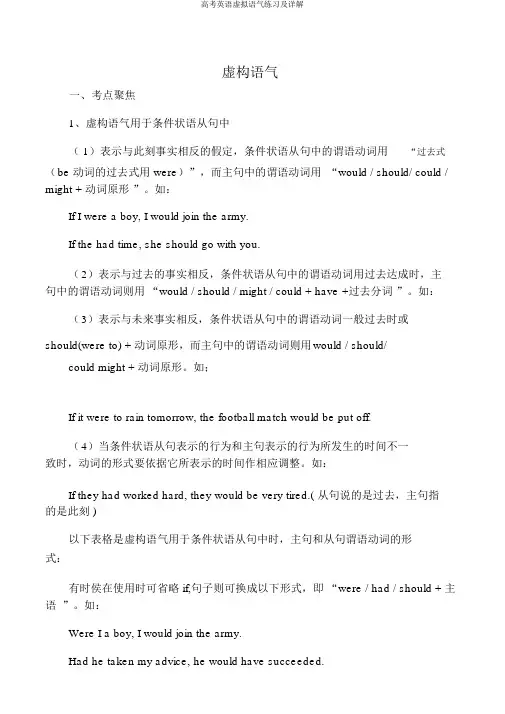
虚构语气一、考点聚焦1、虚构语气用于条件状语从句中( 1)表示与此刻事实相反的假定,条件状语从句中的谓语动词用“过去式(b e 动词的过去式用 were)”,而主句中的谓语动词用“would / should/ could / might + 动词原形”。
如:If I were a boy, I would join the army.If the had time, she should go with you.(2)表示与过去的事实相反,条件状语从句中的谓语动词用过去达成时,主句中的谓语动词则用“would / should / might / could + have +过去分词”。
如:(3)表示与未来事实相反,条件状语从句中的谓语动词一般过去时或should(were to) + 动词原形,而主句中的谓语动词则用would / should/ could might + 动词原形。
如;If it were to rain tomorrow, the football match would be put off.(4)当条件状语从句表示的行为和主句表示的行为所发生的时间不一致时,动词的形式要依据它所表示的时间作相应调整。
如:If they had worked hard, they would be very tired.( 从句说的是过去,主句指的是此刻 )以下表格是虚构语气用于条件状语从句中时,主句和从句谓语动词的形式:有时侯在使用时可省略 if,句子则可换成以下形式,即“were / had / should + 主语”。
如:Were I a boy, I would join the army.1/14Were it not for the expense, I would go to .2、虚气用于名性从句( 1)虚气在从句中的运用。
①“ wish + 从句”表示不可以的梦想,“假如⋯⋯就好了”等。
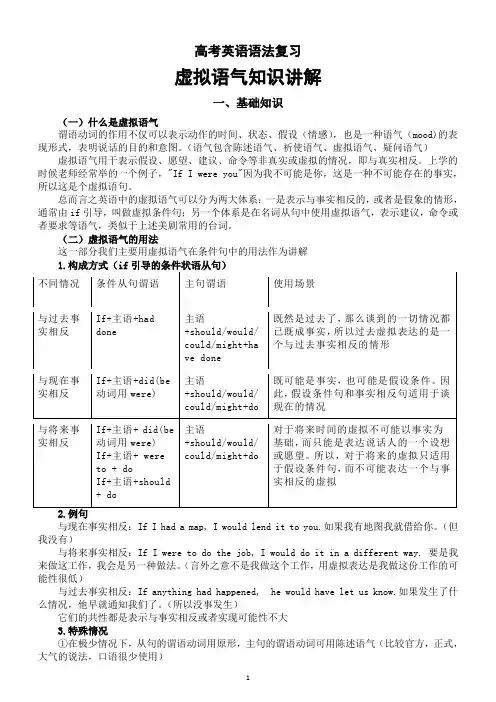
高考英语语法复习虚拟语气知识讲解一、基础知识(一)什么是虚拟语气谓语动词的作用不仅可以表示动作的时间、状态、假设(情感),也是一种语气(mood)的表现形式,表明说话的目的和意图。
(语气包含陈述语气、祈使语气、虚拟语气、疑问语气)虚拟语气用于表示假设、愿望、建议、命令等非真实或虚拟的情况,即与真实相反。
上学的时候老师经常举的一个例子,"If I were you"因为我不可能是你,这是一种不可能存在的事实,所以这是个虚拟语句。
总而言之英语中的虚拟语气可以分为两大体系:一是表示与事实相反的,或者是假象的情形,通常由if引导,叫做虚拟条件句;另一个体系是在名词从句中使用虚拟语气,表示建议,命令或者要求等语气,类似于上述美剧常用的台词。
(二)虚拟语气的用法这一部分我们主要用虚拟语气在条件句中的用法作为讲解与现在事实相反:If I had a map, I would lend it to you.如果我有地图我就借给你。
(但我没有)与将来事实相反:If I were to do the job, I would do it in a different way. 要是我来做这工作,我会是另一种做法。
(言外之意不是我做这个工作,用虚拟表达是我做这份工作的可能性很低)与过去事实相反:If anything had happened, he would have let us know.如果发生了什么情况,他早就通知我们了。
(所以没事发生)它们的共性都是表示与事实相反或者实现可能性不大3.特殊情况①在极少情况下,从句的谓语动词用原形,主句的谓语动词可用陈述语气(比较官方,正式,大气的说法,口语很少使用)If that be the official view, it cannot be accepted.如果这是官方的看法,这是不能接受的。
②if可以省略,但是语序要改为倒装Were I Tom I would refuse.如果我是汤姆我会拒绝。
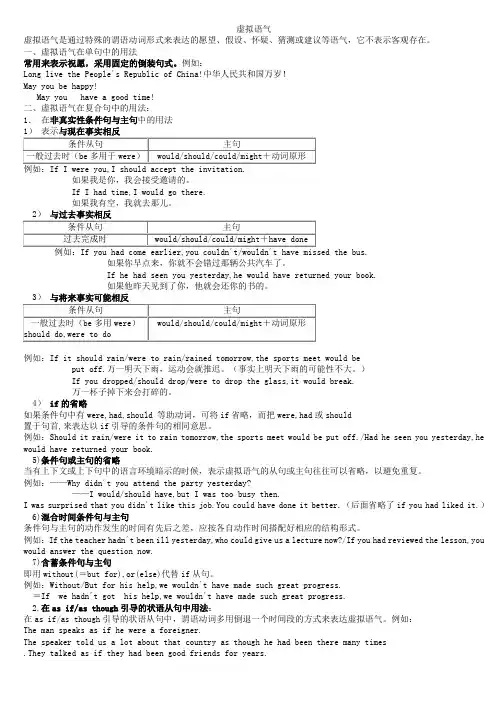
虚拟语气虚拟语气是通过特殊的谓语动词形式来表达的愿望、假设、怀疑、猜测或建议等语气,它不表示客观存在。
一、虚拟语气在单句中的用法常用来表示祝愿,采用固定的倒装句式。
例如:Long live the People´s Republic of China!中华人民共和国万岁!May you be happy!May you have a good time!二、虚拟语气在复合句中的用法:1.在非真实性条件句与主句中的用法如果我是你,我会接受邀请的。
If I had time,I would go there.如果我有空,我就去那儿。
如果你早点来,你就不会错过那辆公共汽车了。
If he had seen you yesterday,he would have returned your book.如果他昨天见到了你,他就会还你的书的。
例如:If it should rain/were to rain/rained tomorrow,the sports meet would beput off.万一明天下雨,运动会就推迟。
(事实上明天下雨的可能性不大。
)If you dropped/should drop/were to drop the glass,it would break.万一杯子掉下来会打碎的。
4)if的省略如果条件句中有were,had,should 等助动词,可将if省略,而把were,had或should置于句首,来表达以if引导的条件句的相同意思。
例如:Should it rain/were it to rain tomorrow,the sports meet would be put off./Had he seen you yesterday,he would have returned your book.5)条件句或主句的省略当有上下文或上下句中的语言环境暗示的时候,表示虚拟语气的从句或主句往往可以省略,以避免重复。
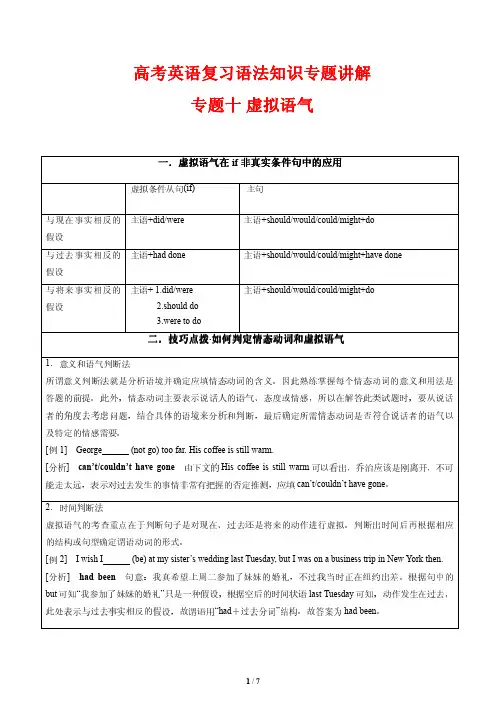
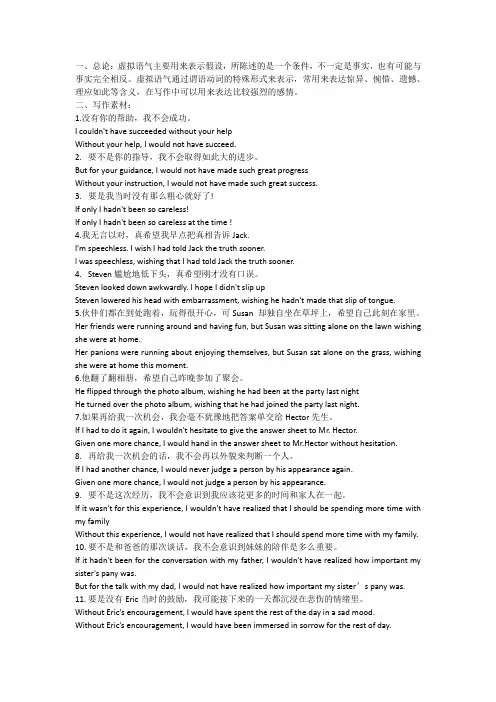
一、总论:虚拟语气主要用来表示假设,所陈述的是一个条件,不一定是事实,也有可能与事实完全相反。
虚拟语气通过谓语动词的特殊形式来表示,常用来表达惊异、惋惜、遗憾、理应如此等含义,在写作中可以用来表达比较强烈的感情。
二、写作素材:1.没有你的帮助,我不会成功。
I couldn't have succeeded without your helpWithout your help, I would not have succeed.2.要不是你的指导,我不会取得如此大的进步。
But for your guidance, I would not have made such great progressWithout your instruction, I would not have made such great success.3.要是我当时没有那么粗心就好了!If only I hadn't been so careless!If only I hadn't been so careless at the time !4.我无言以对,真希望我早点把真相告诉Jack.I'm speechless. I wish I had told Jack the truth sooner.l was speechless, wishing that I had told Jack the truth sooner.4.Steven尴尬地低下头,真希望刚才没有口误。
Steven looked down awkwardly. I hope I didn't slip upSteven lowered his head with embarrassment, wishing he hadn't made that slip of tongue.5.伙伴们都在到处跑着,玩得很开心,可Susan 却独自坐在草坪上,希望自己此刻在家里。
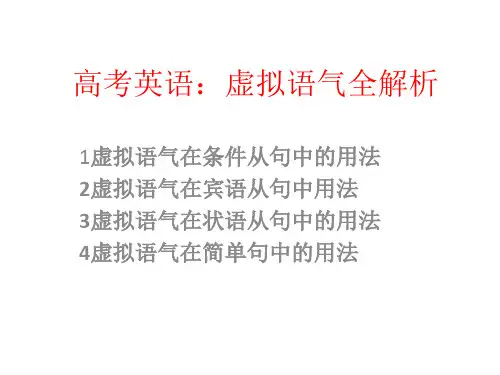

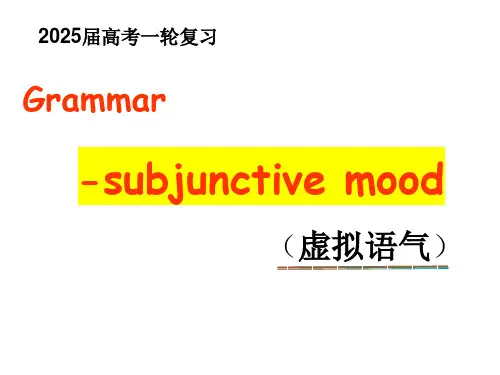
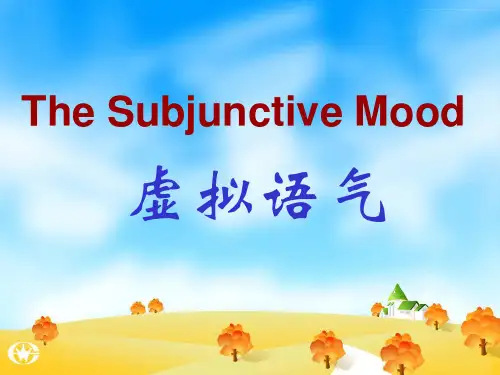
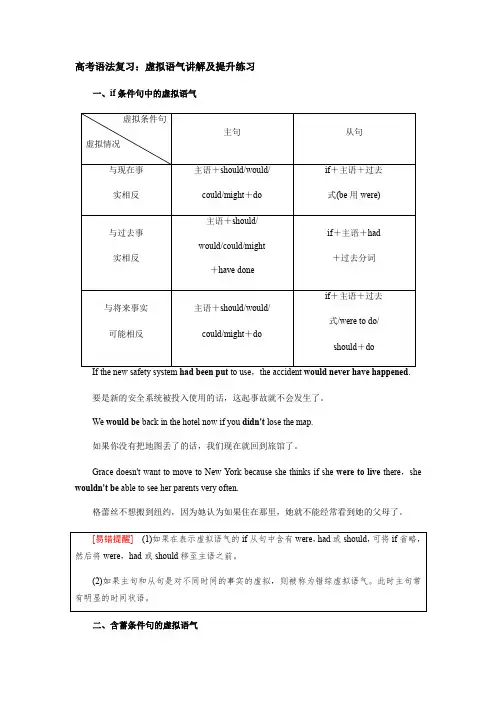
高考语法复习:虚拟语气讲解及提升练习一、if条件句中的虚拟语气要是新的安全系统被投入使用的话,这起事故就不会发生了。
We would be back in the hotel now if you didn't lose the map.如果你没有把地图丢了的话,我们现在就回到旅馆了。
Grace doesn't want to move to New York because she thinks if she were to live there,she wouldn't be able to see her parents very often.格蕾丝不想搬到纽约,因为她认为如果住在那里,她就不能经常看到她的父母了。
二、含蓄条件句的虚拟语气有时假设的条件不通过条件状语从句表达出来,而是隐含在某些词或短语中,或隐含在上下文中,这叫含蓄虚拟语气。
常用的这类词或短语有:without(要是)没有;but for要不是;otherwise/or否则等。
—Do you have Betty's phone number?——你有贝蒂的电话号码吗?—Yes.Otherwise,I wouldn't have been able to reach her yesterday.——有,不然我昨天就联系不上她了。
Many of the things we now benefit from would not be around but for Thomas Edison.要不是托马斯·爱迪生,我们现在从中受益的很多东西就不会存在。
三、虚拟语气在从句中的运用1.在名词性从句中的运用(1)在表示要求、命令、建议、请求等动词后的宾语从句中,以及这些动词的名词形式后面的同位语或表语从句中的谓语动词用“(should+)动词原形”。
常见的此类动词:一坚持(insist)、二命令(order,command)、三要求(require,demand,request)、四建议(suggest,advise,propose,recommend)。
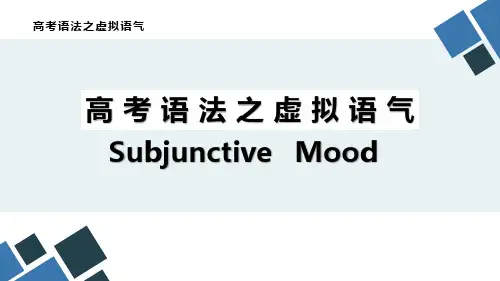
虚拟语气虚拟语气表示动作或状态与事实相反,或不可能发生的情况。
一、虚拟语气用于条件状语从句中从句主句与现实事实相反一般过去式(be--were)Should/would/could/might + V原与过去事实相反Had + done Should/would/could/might +have done与将来事实相反过去式;should+V 原;were to + V原Should/would/could/might + V原1. 表示与现在事实相反或不可能发生:条件状语从句:一般过去时(虚拟语气中be→were)主句用:would(should, could, might)+动词原形。
If we had time now, we would read it again.If I were you, I would work hard.2. 表示与过去事实相反或不可能发生:条件状语从句:had+过去分词;主句:would(should, could, might)+have+过去分词。
If he had taken my advice, he would have succeeded in the test.If I had known your telephone number then, I would have called you.3. 表示与将来的事实可能相反或不可能发生:条件状语从句:①一般过去时②should +动词原形③were to+动词原形;主句:would(should, could, might)+动词原形。
If it should rain, the crops would be saved.If it were to snow tomorrow, they would not go out.例句:If there were no subjunctive mood, English ( ) much easier to learn. (B)A. could have beenB. would beC. will beD. would have been(2)省略if的虚拟语气如果从句中含有were/ should/ had时,则可以把这三个词置于句首,省略if.采用倒装语序。
高中英语虚拟语气讲解及练习虚拟条件句就是对现实条件的一种虚拟假设,所假设的条件一般不符合事实或与事实相反或在现实中发生的可能性极小。
根据时间的不同,虚拟条件句可分为三种,即与现在事实相反的虚拟条件句、与过去事实相反的虚拟条件句(1)表示与现在事实相反If I had enough money now, I would lend it to you.(2)表示与过去事实相反If he had taken your advice, he wouldn’t have made such a bad mistake.(3)表示与将来事实相反I would go shopping with you if it were to be Sunday tomorrow.1. 虚拟条件句的倒装在虚拟条件句中,为了强调所假设条件的虚拟性,或突出说话人的一种主观愿望,虚拟条件句可用倒装结构。
虚拟条件句的倒装是通过去掉if,把条件从句谓语中的助动词、情态动词或系动词放在句首实现的。
例如:Had I been(= If I had been ) in that situation, I would not have let the thief escape away with so much money.Should there be (= If there should be) a drought, what should we do at that time ?2. 错综时间条件句有时条件从句的动作和主句的动作发生的时间并不一致,这时谓语动词的形式应根据它所要表示的具体时间来确定。
例如:If we hadn’t been working hard in the past few years ,thing s wouldn’t be going so smoothly.3. 含蓄条件句有时假设的情况并不以条件从句的形式表现出来,而是通过某个介词或介词短语(如:with,otherwise,without,but for,in that position)、上下文或其它方式表现出来。
高考英语语法复习情态动词与虚拟语气知识讲解一、情态动词(1)表示能力时,can只用于一般现在时,could仅用于一般过去时;而be able to则有更多的时态,如将来时、完成时等。
I haven’t been able to read that report yet.He will be able to skate as well as you.(2)Was/were able to表示能力时,侧重经过努力而成功做到某事;而could仅表示具备能力,不说明是否实施了能力。
He studied hard and was able to pass the exam.(3)用在其他动词,如might,may,would,want,hope等之后表示能力只能用be able to。
He might be able to fix your car.(1)must还可以表示质问或感情色彩,意为“偏要,偏偏”。
Why must it snow on Saturday?(2)should还可以表示惊奇、愤怒、失望等特殊情感,尤其用在以why,who,how等开头的疑问句中或某些感叹句中。
why should you be so late today?(1)must作“必须”讲的一般疑问句,其肯定回答用must,否定回答用needn’t或don’t have to。
-Must I pay now?-Yes, you must./No, you needn’t.(2)need还可以作实义动词,有人称和数的变化,后跟带to的不定式作宾语。
She needed to go out for a walk.(1)两者在表示过去的习惯动作或行为时常可通用。
When we were children, we would/used to go skating every winter.(2)Used to与would都不能与表示具体频率、次数的词及特定的时间状语或具体的一段时间连用。
虚拟语气一、定义:虚拟语气表示动作或状态与事实相反,或不可能发生的情况。
1.虚拟语气用于条件状语从句中1)表示与现在事实相反或不可能发生:一般过去时(虚拟语气中be→were)Eg. If he had time, he would (could, might) go with youEg.If I were you, I would work hard.2)表示与过去事实相反或不可能发生Eg.If I had time last night, I should have come to see you.Eg.If they had helped us, we would have finished the task. (实际上没帮)3)表示与将来的事实可能相反或不可能发生Eg.If it should rain, the crops would be saved.Eg.If it were to snow tomorrow, they would not go out.4)※注意:虚拟语气的倒装语序:如果if从句里含有should, had, were或其他助动词,则可将从属连词if省去,将助动词.情态动词.be或have放在句首形成部分倒装.Eg.If I had time, I would have done that yesterday.=Had I had time, I would have done that yesterday.Eg.If I were you, I would go to the party.=Were I you, I would go to the party.Eg.If it should rain tomorrow, I would stay at home=Should it rain tomorrow, I would stay at home.2. 虚拟语气在宾语从句中的用法在动词wish后的宾语从句中,表示与现在或过去的事实相反,或对将来的主观愿望,从句通常省略连词that。
高中语法专题解析虚拟语气虚拟语气(Subjunctive Mood)是英语中一种特殊的语气,用于表示假设、愿望、建议、要求、命令等虚拟的情况或假设。
在高中语法学习中,掌握虚拟语气的用法是十分重要的。
本文将针对高中语法专题解析虚拟语气进行详细讲解。
一、条件虚拟语气条件虚拟语气用于表示与现实相反的假设情况,包括对现在和将来的假设。
其主要形式为:if + 条件从句 (Past Simple), 主句(would/could/might + 动词原形),例如:1. If I were a bird, I would fly in the sky freely.(如果我是一只鸟,我就可以在天空中自由飞翔。
)2. If it rained tomorrow, we would stay at home.(如果明天下雨,我们会呆在家里。
)需要注意的是,条件从句中的动词通常使用过去式形式,而主句中的动词则使用情态动词 would/could/might + 动词原形的形式。
二、虚拟语气用于表达愿望、建议、要求1. 表达愿望虚拟语气可以用于表达对现在或将来情况的愿望,常见的句型有:- I wish/If only + 主语 + 过去式:用于表达对现在情况的不满或遗憾的愿望,例如:"I wish I were taller."(我希望我个子高一些。
)- I wish/If only + 主语 + would/could/过去式:用于表达对现在情况的希望或期望,例如:"I wish you would come to my party."(我希望你能来参加我的派对。
)2. 表达建议虚拟语气可以用于表达对过去情况的建议,常见的句型有:- It's time/It's high time + 主语 + 过去式:用于表示现在情况应该采取的行动,例如:"It's time you finished your homework."(你该完成作业了。
虚拟语气一、考点聚焦1、虚拟语气用于条件状语从句中(1)表示与现在事实相反的假设,条件状语从句中的谓语动词用“过去式(be动词的过去式用were)”,而主句中的谓语动词用“would / should/ could / might + 动词原形”。
如:If I were a boy, I would join the army.If the had time, she should go with you.(2)表示与过去的事实相反,条件状语从句中的谓语动词用过去完成时,主句中的谓语动词则用“would / should / might / could + have +过去分词”。
如:If he had taken my advice, he would have succeeded in the competition.(3)表示与将来事实相反,条件状语从句中的谓语动词一般过去时或should(were to) + 动词原形,而主句中的谓语动词则用would / should/could might + 动词原形。
如;If it were to rain tomorrow, the football match would be put off.(4)当条件状语从句表示的行为和主句表示的行为所发生的时间不一致时,动词的形式要根据它所表示的时间作相应调整。
如:If they had worked hard, they would be very tired.(从句说的是过去,主句指的是现在)Were I a boy, I would join the army.Had he taken my advice, he would have succeeded.Were it not for the expense, I would go to Britain.2、虚拟语气用于名词性从句(1)虚拟语气在宾语从句中的运用。
①“wish + 宾语从句”表示不能实现的愿望,译为“要是……就好了”等。
表示现在不能实现的愿望,从句中的谓语动词用一般过去时;表示将来不能实现的愿望,从句中的谓语动词用“would/could + 动词原形”;表示过去不能实现的愿望,从句中的谓语动词用“had + 过去分词”或“could(should) + have + 过去分词”。
如:I wish it were spring all the year round.I wish I had known the answer.I wish I could fly like a bird.②在表示建议、要求、命令等的动词suggest、advise、propose、demand、require、insist request、command、order等后的宾语从句中,谓语动词用should + 动词原形或是动词原形。
如:She suggested we (should)leave here at once.The doctor ordered she should be operated.(2)虚拟语气在同位语从句和表语从句中的运用。
作表示建议、要求、命令等的名词advise、idea、order、demand、plan、proposal、suggestion、request等的表语从句和同位语从句,从句中的谓语动词用“(should)+ 动词原形”。
如:His suggestion that we (should)go to Shanghai is wonderful.My idea is that they (should)pay 100 dollars.(3)虚拟语气在主语从句中的运用。
在主语从句中,谓语动词的虚拟语气用“should + 动词原形”的结构,表示惊奇、不相信、理应如此等。
如:It is necessary(important, natural, strange, etc.)that we should clean the room every day.It was a pity (a shame, no wonder, etc.)that you should be so careless.It will be desired(suggested, decided, ordered, requested, proposed, etc.)that she should finish her homework this afternoon.注意:这种从句表示的是事实。
如果说人对这种事实表现出惊奇的情感,就可用虚拟语气。
反之,如果不表示惊奇等情感,that从句也可用陈述句语气。
如:I t is pity that you can’t swim.3、虚拟语气在其他场合的运用(1)虚拟语气在as if/as though、even if/even though等引导的表语从句或状语从句中,如果从句表示的动作发生在过去,用过去完成时;指现在状况,则用一般过去时;指将来状况则用过去将来时。
如:He did it as if he were an expert.Even if she were here, she could not solve the problem.(2)虚拟语气用于定语从句中。
这种从句常用于句型“It is (high)time (that) … ”中,定语从句的谓语动词用一般过去时(be用were)或should + 动词原形,意思是“(现在)该……”。
如:It’s time that I picked up my daughter.It’s high time we were going.(3)虚拟语气用在if only引导的感叹句中。
如:If only I were a bird.If only I had taken his advice.(4)虚拟语气在一些简单句中的运用。
①情态动词的过去式用于现在时态时,表示说话人谦虚、客气、有礼貌或语气委婉,常出现在日常会话中。
如:It would be better for you not to stay up too late.Would you be kind enough to close the door?②用于一些习惯表达法中。
如:Would you like a cup of tea?I would rather not tell you.二、精典名题导解选择填空1. When a pencil is partly in a glass of water, it looks as if it _______. (NMET 95)A.breaksB.has brokenC.were brokenD.had been broken解析:答案为C。
本题考查的是as if 引导的让步状语从句中的语气问题,as if引导的状语从句如果与事实一致,不用虚拟语气,如果与事实相反,应用虚拟语气。
题中“当铅笔的一部分浸在水中,铅笔看上去好像断了”。
而实际上铅笔并未断,与事实相反,前半部分陈述是一般现在时,因而本句是对一般现在时的虚拟,用were broken。
2. I didn’t see your sister at the meeting. If she ___________, she would have met my brother.(NMET 94)A.has comeB.did comeC.cameD.had come解析:答案为D。
本题考查的是if条件句中的虚拟语气。
题意是:我在会议上没看到你姐姐,故你姐姐没来。
因此如果“她来了”与事实相反,前面一句交代了虚拟语气的时态是一般过去时的虚拟,所以if从句中用had+过去分词。
3. —If he ___________, he ________that food.—Luckily he was sent to the hospital immediately.(NMET 93)A.was warned; would not takeB.had been warned; would not have takenC.would be warned; had not takenD.would have been warned; had not taken解析:答案为B。
本题考查的是条件状语从句与主句表示与事实相反时虚拟语气的用法。
根据下一句语境可知,他事先并没有得到警告,表示过去时间的虚拟语气,故选B。
4.Mr.White at 8:30 for the meeting, but he didn’t show up.A. should have arrivedB. should arriveC. should have had arrivedD. should be arriving解析:答案为A。
本题考虚拟语气及责备的用法,全句意为:Mr.white 8:30(原本)应该到会的,但他没露面。
全句谈的是过去的事,故应使用should have done结构,表原本该做而没做的事。
5.—I’ll tell Mary about her new job tomorrow.—You her last week.A. ought to tellB. would have toldC. must tellD. should have told解析:答案为D。
本题考查情态动词用法,should(ought to)have done表示说话人对发生的事性“责备”故选D。
6.—Let’s go and have a good drink tonight.—Have you got the first prize in the competition?A. What for?B. Thanks a lot.C. Yes, I’d like to.D. Why not?解析:答案为A。
考语境及交际用语。
前句建议:今晚咱们出去好好喝一顿吧。
喝一顿应有个来由和原因,且多是为了庆祝某事,所以后句问:为何事(庆祝)?你是不是在竞赛中得了一等奖?这样才能表示后者惊讶、疑问和兴奋,what for:为何而做某事?其余均不合语境。